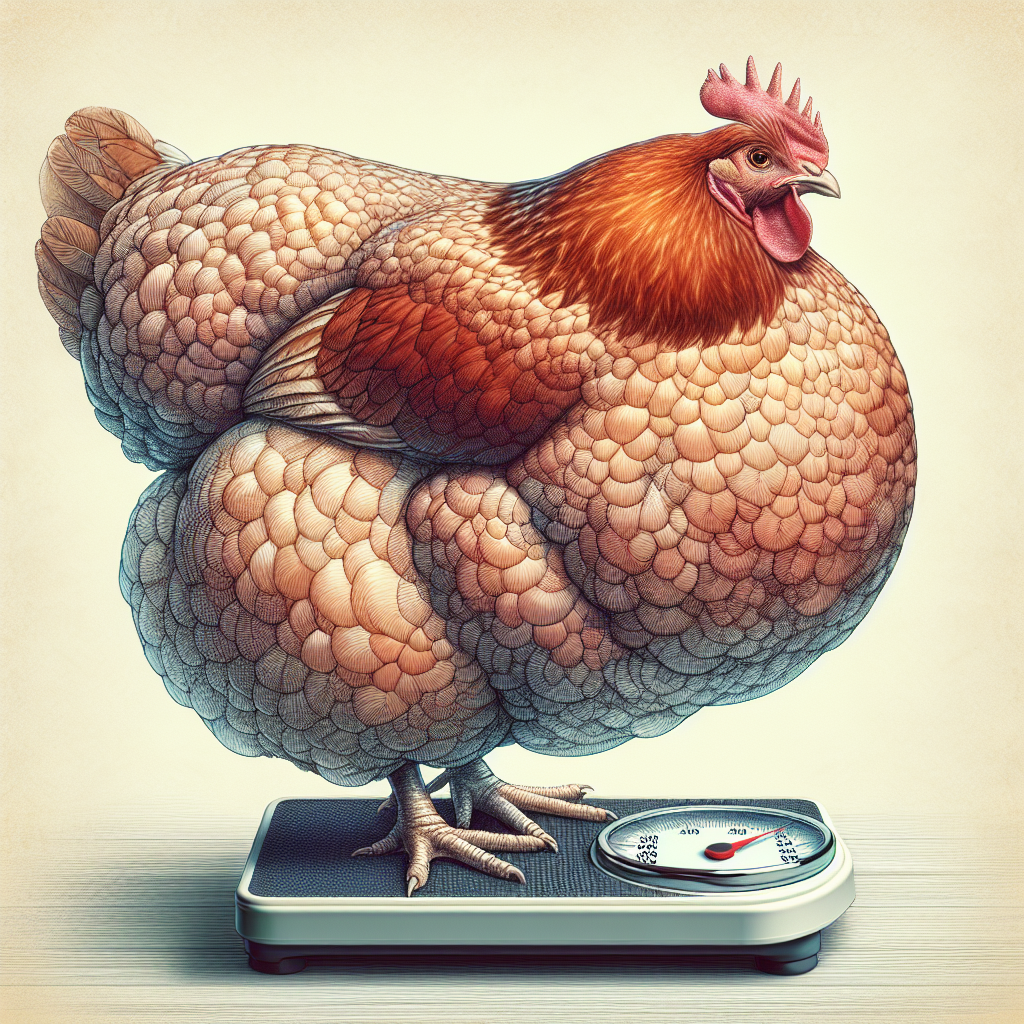Are you interested in providing the best possible nutrition for your chickens while also prioritizing their health? Look no further! In this article, we will explore the world of organic feed options and how they can benefit the well-being of your feathered friends. From nutrient-rich grains to natural supplements, discover the various choices available to ensure your chickens thrive on a wholesome and organic diet. Say goodbye to synthetic additives and embrace a healthier approach to nourishing your flock. Let’s uncover the secrets behind organic feed options that support chicken health!
The Importance of Organic Feed for Chicken Health
As a responsible chicken owner, you want the best for your feathered friends. Providing them with a healthy and balanced diet is crucial for their well-being, and one way to achieve this is by feeding them organic feed. Organic chicken feed is not only beneficial for the chickens themselves but also for the environment and for those consuming their eggs or meat. In this article, we will explore the importance of organic feed for chicken health and discuss various aspects related to it.
Understanding Organic Chicken Feed
What is Organic Chicken Feed?
Organic chicken feed is specifically formulated to meet the nutritional needs of chickens while adhering to organic farming principles. It is made from ingredients that are grown without the use of synthetic pesticides, fertilizers, hormones, or genetically modified organisms (GMOs). The feed itself is also free from artificial preservatives, colors, and flavors. By feeding your chickens organic feed, you ensure that they receive a natural and wholesome diet.
Regulations and Certifications
To ensure the authenticity and quality of organic chicken feed, it is important to consider the regulations and certifications associated with it. In many countries, organic farming practices are regulated by government bodies or independent certifying agencies. These organizations set standards for organic feed production, including the sourcing of organic ingredients, the handling and processing of the feed, and the labeling and marketing of organic products. Look for trusted certifications such as USDA Organic or the European Union Organic Logo when purchasing organic chicken feed.
Benefits of Organic Chicken Feed
Feeding your chickens organic feed comes with numerous benefits. Firstly, organic feed promotes the overall health and well-being of your chickens. It provides them with essential nutrients, vitamins, and minerals that contribute to their growth, development, and strong immune system. Organic feed also helps to prevent diseases and reduce the usage of antibiotics in chicken farming.
Furthermore, organic feed is free from harmful additives and contaminants that can have detrimental effects on your chickens’ health. By feeding them organic feed, you eliminate the risk of exposing them to synthetic pesticides, GMOs, and antibiotic residues that are commonly found in non-organic feed. This not only ensures your chickens’ health but also contributes to the production of healthier and safer eggs or meat for human consumption.
Nutritional Requirements for Healthy Chickens
Basic Nutrients Needed by Chickens
Just like humans, chickens require a balanced diet to thrive. The basic nutrients needed by chickens include proteins, carbohydrates, fats, vitamins, minerals, and water. Proteins are essential for muscle development and egg production, while carbohydrates provide energy. Fats also serve as an energy source and help with nutrient absorption. Vitamins and minerals support various bodily functions and contribute to overall health. Lastly, water is crucial for hydration and the proper functioning of the chickens’ digestive system.
Specific Nutritional Needs for Different Stages of Life
Chickens have different nutritional needs at each stage of their lives. Chicks, for example, require a higher protein content to support their rapid growth. As they mature, their protein requirements decrease, but they still need a well-balanced diet to maintain optimal health. Layer hens, on the other hand, require additional calcium to produce high-quality eggs with strong shells. By providing your chickens with organic feed, you can ensure that their specific nutritional needs are met at every stage.
Common Ingredients in Organic Chicken Feed
Corn and Soy
Organic chicken feed often contains a combination of corn and soy, which are excellent sources of proteins and carbohydrates. Corn provides energy and is easily digestible, while soy is a complete protein that contains all the essential amino acids. These ingredients, when sourced organically, provide the necessary nutrients for chickens’ growth and development.
Grains and Seeds
Whole grains and seeds are commonly found in organic chicken feed. Ingredients such as wheat, oats, barley, and millet are rich in carbohydrates and fiber, providing chickens with sustained energy throughout the day. Seeds like flaxseed and sunflower seeds are packed with healthy fats and essential nutrients, contributing to overall chicken health.
Herbs and Forage
Organic chicken feed may also include herbs and forage, such as alfalfa and clover. These ingredients provide additional vitamins and minerals, as well as natural antioxidants and anti-inflammatory properties. Chickens also enjoy pecking and foraging on these ingredients, which promotes physical activity and mental stimulation.
Optimizing Chicken Health with Organic Feed Additives
Probiotics and Prebiotics
To further enhance the health of your chickens, organic feed additives can be incorporated into their diet. Probiotics and prebiotics, for example, support a healthy gut microbiome and improve digestion. Probiotics are live beneficial bacteria that boost the chickens’ immune system and aid in nutrient absorption, while prebiotics are the food for these beneficial bacteria, promoting their growth and proliferation.
Herbs and Spices
Many herbs and spices have natural antimicrobial and immune-boosting properties, making them beneficial additions to organic chicken feed. Garlic, oregano, and thyme, for instance, act as natural antibiotics and help protect against common infections. Turmeric and ginger are known for their anti-inflammatory effects, reducing the risk of chronic diseases in chickens.
Natural Supplements
Organic feed can also be supplemented with natural additives such as kelp, fish meal, or insect protein. These ingredients provide additional vitamins, minerals, omega-3 fatty acids, and other essential nutrients that contribute to chicken health. Natural supplements can be particularly beneficial if your chickens have specific dietary requirements or if you want to support their overall well-being.
Avoiding Harmful Additives and Contaminants
Understanding Harmful Additives
Non-organic chicken feed often contains harmful additives and synthetic substances that can negatively impact chicken health. Antibiotic growth promoters, for example, are commonly used in conventional poultry farming to promote growth and prevent diseases. However, their overuse can lead to antibiotic resistance and pose health risks to both chickens and consumers. By choosing organic feed, you avoid exposing your chickens to such harmful additives.
Contaminants in Non-Organic Feed
Non-organic feed may also contain contaminants such as pesticide residues, heavy metals, and mycotoxins. Pesticides, which are used in conventional agriculture to control pests and weeds, can accumulate in feed crops, posing health risks to chickens and affecting egg or meat quality. Heavy metals can be present in contaminated soils or water used for irrigation, while mycotoxins are produced by molds that can grow on feed ingredients. Organic feed minimizes the exposure to these contaminants, ensuring the safety and quality of your chickens’ diet.
GMOs and Pesticide Residues
Genetically modified organisms (GMOs) and pesticide residues are major concerns in non-organic feed. GM crops, which are engineered to withstand pests or herbicides, may contain residual traces of these genetically modified traits. Additionally, pesticides used in conventional agriculture can leave residues on crops, even after processing into feed. By choosing organic feed, you can be confident that your chickens are not consuming GMOs or pesticide residues.
Finding High-Quality Organic Chicken Feed
Local Farms and Suppliers
When searching for high-quality organic chicken feed, consider connecting with local farms and suppliers. Local farmers often prioritize sustainable and organic practices, and they may offer organic feed made from locally sourced ingredients. Supporting local businesses not only ensures the freshness of the feed but also promotes the local economy and reduces the carbon footprint associated with long-distance transportation.
Certified Organic Brands
Certified organic brands are another reliable option for sourcing organic chicken feed. Look for reputable brands that display certifications such as USDA Organic or the European Union Organic Logo. These certifications ensure that the feed meets strict organic standards and has been produced and processed according to regulations. Reading reviews and seeking recommendations from other chicken owners can also help you find trusted brands that provide high-quality feed.
Reading Labels and Understanding Ingredients
When purchasing organic chicken feed, it is essential to read and understand the labels and ingredient lists. Look for clear indications that the feed is certified organic and free from synthetic additives. Familiarize yourself with the different ingredients used in organic feed and their nutritional benefits. This knowledge will help you make informed decisions when choosing the best feed for your chickens.
Challenges and Considerations of Using Organic Chicken Feed
Cost and Availability
One of the main challenges of feeding your chickens organic feed is its cost and availability. Organic ingredients are typically more expensive than their conventional counterparts, which reflects the labor-intensive practices and lower yields associated with organic farming. Additionally, depending on your location, finding a consistent supply of organic feed might be challenging. However, the long-term benefits of organic feed for your chickens’ health and the quality of their products often outweigh the initial cost and effort.
Managing Nutritional Balance
Feeding your chickens a well-balanced diet is crucial for their health and productivity. While organic feed provides a solid foundation, it is important to consider other sources of nutrition, such as kitchen scraps, foraging, or additional supplements. Consulting with a veterinarian or a poultry nutritionist can help you develop a comprehensive diet plan tailored to your chickens’ specific needs, ensuring that they receive all the necessary nutrients.
Transitioning from Conventional to Organic Feed
If you are currently feeding your chickens with conventional feed, transitioning to organic feed should be done gradually. Sudden dietary changes can upset the chickens’ digestive system and cause unnecessary stress. Start by incorporating small amounts of organic feed into their diet while gradually reducing the amount of conventional feed. This gradual transition allows their digestive system to adjust and adapt to the new feed, ensuring a smooth switch to organic.
Integrating Organic Feed into a Comprehensive Chicken Health Plan
Balancing Feed with Other Aspects of Chicken Health
While organic feed is a crucial component of your chickens’ health, it is important to remember that it is just one piece of the puzzle. To ensure optimal chicken health, it is essential to consider other factors such as access to clean water, a clean and spacious living environment, regular exercise, and protection against predators or disease. A holistic approach to chicken health, including organic feed, will result in happier and healthier chickens.
Working with Veterinarians and Nutritionists
When creating a comprehensive chicken health plan, it is beneficial to seek guidance and advice from professionals such as veterinarians and poultry nutritionists. They have the knowledge and expertise to assess the specific needs of your chickens and recommend the best dietary practices. Regular check-ups and consultations can help identify any potential health issues early on and provide appropriate solutions.
Monitoring and Adjusting Feed Options
Regularly monitoring your chickens’ health, egg production, and overall behavior is essential in determining whether their feed is meeting their needs. Keep an eye out for any signs of nutritional deficiencies or imbalances, such as lethargy, feather loss, poor egg quality, or abnormal behaviors. If necessary, consult with professionals to make adjustments to their diet or seek additional supplementation to optimize their health.
Conclusion
Feeding your chickens organic feed is a significant step towards promoting their health, as well as the health of those who consume their eggs or meat. Organic feed provides essential nutrients, avoids harmful additives and contaminants, and supports sustainable agricultural practices. By understanding the nutritional requirements of your chickens, sourcing high-quality organic feed, and integrating it into a comprehensive chicken health plan, you can ensure that your chickens live a happy and healthy life. Remember, the well-being of your chickens begins with the food they eat.




